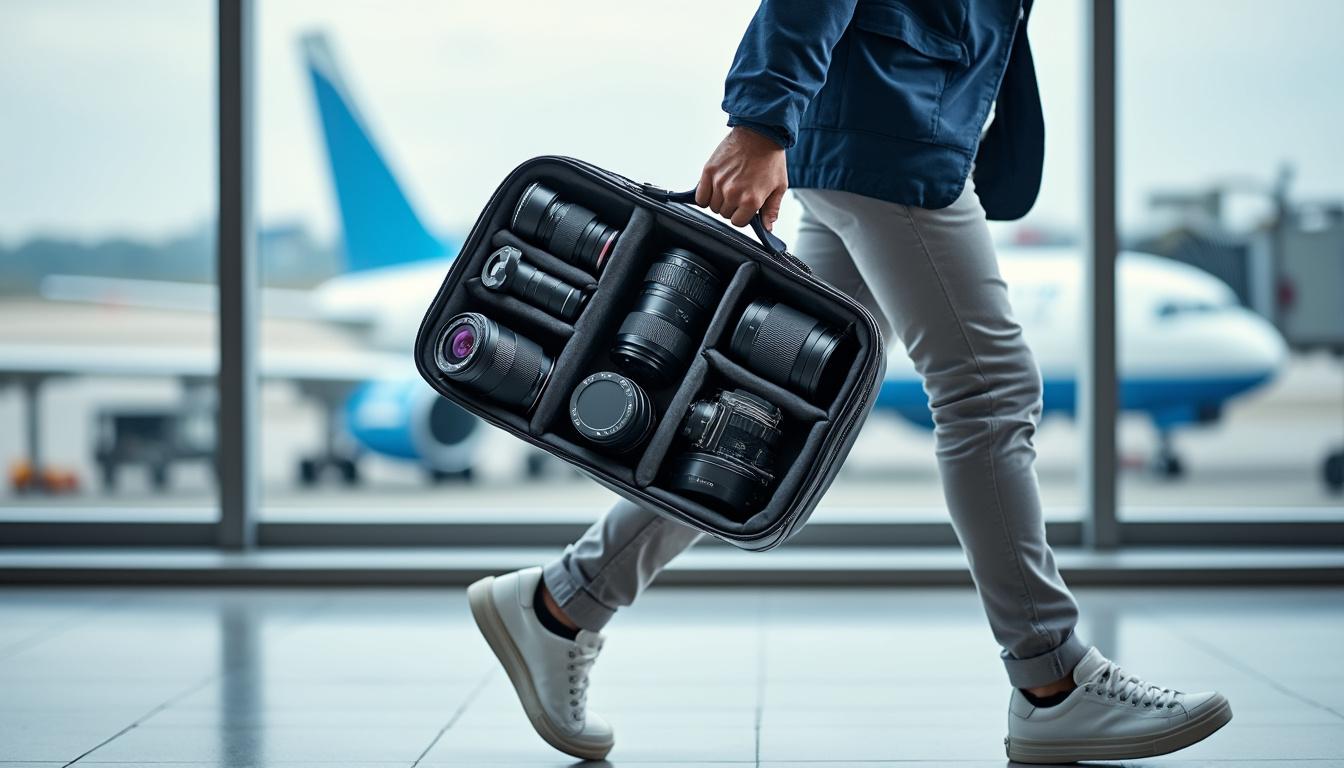Flying with camera equipment remains one of the trickiest parts of traveling for photographers and enthusiasts alike. Beyond the challenge of managing bulky gear and delicate optics, the unpredictability of air travel adds layers of complexity. With frequent luggage mishaps and stringent security protocols, a strategic approach is essential to safeguard valuables, optimize packing, and ensure smooth transit. From selecting the right camera bag to mastering boarding etiquette, these smart strategies empower travelers to protect their gear and focus on their journey ahead.
Key Strategies for Flying with Camera Equipment Safely
Successful air travel with photography gear begins with planning and adopting practical habits that reduce risk and streamline airport procedures.
- Secure expedited screening: Enrolling in programs like Global Entry or TSA Pre-Check can significantly fast-track security checks, saving precious time and minimizing repetitive unpacking of essentials.
- Always carry on your camera gear: Checking photography equipment increases the risk of loss or damage; keeping it in carry-on luggage ensures constant supervision.
- Choose a compact, sturdy camera backpack: Options such as the Peak Design Everyday Backpack or Think Tank Photo Airport Security V3 are designed to fit under airplane seats and provide excellent protection.
- Organize memory cards and batteries with care: Separate critical items in waterproof cases (e.g., the PGYTECH CreateMate) and store lithium batteries properly to comply with airline safety regulations.
- Prepare for weight limits and space constraints: Airlines vary on carry-on weight allowances; plan contents accordingly to avoid last-minute bag checks or fines.
| Airline | Typical Under-seat Dimensions (inches) | Carry-on Weight Limit (lbs) | Notes |
|---|---|---|---|
| United Airlines | 17 x 10 x 9 | 25 | Fits many compact camera backpacks |
| Delta Air Lines | 18 x 11 x 9 | 22 | Strict on battery storage |
| American Airlines | 16 x 14 x 9 | 22 to 25 | Encourages TSA Pre-Check enrollment |
| Lufthansa | 15 x 11 x 7 | 17 | European standards apply |
Optimizing Your Carry-On: Organizing Camera Gear Effectively
Maximizing every inch of your carry-on bag is crucial. Not only must gear be accessible but also comply with airline regulations and consider practicalities like ease of passage through security checkpoints.
- Use specialized compartments: Dedicated padded slots for lenses, DSLRs, and accessories keep equipment secure while simplifying inspection.
- Keep essential accessories handy: Items like lens cleaning kits, an intervalometer, or spare cables should be reachable without unpacking the entire bag.
- Leverage personal item allowance: Carry an additional small bag for chargers, filters, or even a secondary lens to avoid overloading your primary backpack.
- Wear your coat to free space: Coats often have multiple pockets ideal for small essentials such as memory cards or gloves.
Important Precautions Regarding Lithium Batteries and Airport Security
Lithium batteries are both essential and restricted items onboard. Proper management of these components can prevent delays and baggage confiscation.
- Always carry batteries: Airlines require that spare and installed lithium batteries remain in carry-on luggage, never checked baggage.
- Use battery cases: To reduce the risk of short circuits, store batteries in dedicated organizers or cover terminals with tape.
- Declare if asked: Inform security personnel if you’re traveling with an unusually large quantity of batteries to avoid surprises during screening.
- Be prepared for random bag checks: Security officers may inspect your gear; having everything well-organized can expedite the process and reduce stress.
| Lithium Battery Guidelines | Recommendation |
|---|---|
| Installed in Cameras | Carry on, no special cases needed |
| Spare Batteries | Carry in protective case, no loose storage |
| Quantity Limit | Check airline policies, usually max 20 |
| Lithium-ion Battery Watt-hour | Typically under 100 Wh allowed in carry-on |
Additional Travel Tips for Flying with Camera Equipment
Ensuring a smooth photographic journey involves more than packing techniques. These tips address common challenges.
- Arrive early for boarding: Early boarding guarantees overhead bin space and reduces stress about placing your camera bag.
- Label your gear discreetly: Using subtle tags or tracking devices can prevent theft and assist recovery.
- Carry travel insurance: Specialized insurance by providers like Lowepro or Manfrotto can cover loss and damage during transit.
- Research airport policies: Rules vary between carriers and countries; reviewing policies in advance ensures compliance and readiness.
- Pack light for returns: Leave room for souvenirs and avoid overloading on the return trip as this can necessitate checking bags unexpectedly.
Comprehensive Comparison: Recommended Camera Bags for Air Travel in 2025
| Brand | Model | Capacity (liters) | Under-seat Fit | Key Features | Price Range |
|---|---|---|---|---|---|
| Peak Design | Everyday Backpack V2 | 20 | Yes | Weatherproof, customizable dividers, quick side-access | $$$ |
| Think Tank Photo | Airport Security V3 | 17 | Yes | Carry-on compliant, lockable zippers, robust padding | $$$ |
| Lowepro | ProTactic BP 350 AW II | 22 | Yes | Modular organization, all-weather cover | $$$ |
| Manfrotto | Pro Light Cinematic Backpack | 18 | Yes | Ergonomic, laptop compartment, waterproof | $$$ |
| Tenba | Solis Backpack 20L | 20 | Yes | Lightweight, flexible storage, durable materials | $$ |
| Ruggard | Ranger 50 | 50 | No | Hard case option, weather-resistant | $$$ |
| SlingShot | Ultralight Sling | 8 | Yes* | Single strap, quick access, compact | $$ |
| Vanguard | Alta Sky 51D | 51 | No | Ample capacity, robust design | $$$ |
| Tamrac | Velocity 8 | 8 | Yes | Compact, budget-friendly, padded | $ |
| Gitzo | Explorer 100 | 15 | Yes | Professional craftsmanship, lightweight | $$$ |
Essential Links and Resources for Photographers on the Move
- Tips for Successful International Travel – Master global journeys with expert advice.
- Exploring Venice’s Historic Bridges – Add cultural depth to photographic travels.
- Punta Cana: Essential Travel Highlights – Combine different types of travel experiences thoughtfully.
- Discover Spectacular Volcanoes in Spain – Plan destination shoots with dramatic landscapes.
- Bird Watching Travel Guide – Integrate wildlife photography into your next trip.
FAQ On Flying with Camera Equipment
- Q: Is it safe to check camera equipment in checked baggage?
A: It is generally discouraged. Carrying your camera gear as carry-on luggage minimizes risks of loss and damage. - Q: Can I bring multiple lithium batteries on a flight?
A: Yes, but only in carry-on baggage and within the airline’s quantity and watt-hour limits. - Q: How should I store memory cards during travel?
A: Use waterproof, protective cases and carry them with you, never in checked bags. - Q: Which camera bag brands offer the best under-seat fit?
A: Brands like Peak Design, Tenba, and Think Tank Photo are renowned for bags that fit beneath most airplane seats. - Q: What should I do if overhead bin space runs out?
A: Speak politely with airline staff, highlighting the fragile and valuable nature of your gear. Early boarding or airline memberships can help secure space.


